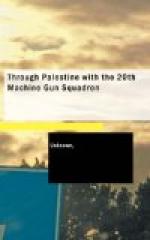A different kind of country was being met with now, much of it being, evidently, cultivated during certain times of the year. Many villages were also passed, some of which looked quite pretty from a distance, clustering among their cactus hedges and a few trees. But anything green would have looked pleasant at that moment to the men who, for so long, had seen nothing but the arid desert. It was a case, however, of “distance lending enchantment to the view”, as a close inspection proved disappointing. The filth in which these people live must be seen to be realised. Language fails in this case! Their houses are simply mud huts consisting, generally, of only one room, in which the whole family live! During the day strong healthy men sit about outside, while the women do all the work, even to the toilsome labour of tilling the ground! A search for water in such places is not a very hopeful matter; at the most there might be two wells, from which water could be got up, a bucketful at a time—a hopeless look out, when there are thousands of thirsty men and horses! Nothing was seen of the enemy that day, and when the sea came in view (what a splendid sight!), it was evident the Gaza forces had escaped.
What an enormous amount of ammunition and stores they had left behind! It has been stated, unofficially, it would have been enough to last them 12 months! Evidently, the enemy did not expect to leave in such a hurry.
That night the Brigade bivouacked at Julis, and the next morning (November 10th), in attempting to water “B” Sub-section was shelled out of Es Suafir el Gharbiye. The Squadron then returned to Julis, and was ordered to off-saddle and look for water at one of the villages near the coast. Eventually they found a moderate supply at Hamame, 3-1/2 miles away, together with—quite unexpectedly—oranges. To say that these were appreciated is hardly adequate, it can well be imagined that they were a luxury just then!
Having returned to camp, Capt. Davies and Lieut. Price excited the envy of the other officers. They had been to El-Mejdel, a few miles south of Hamame, which turned out to be quite civilised compared with the surrounding villages, and they had bought some tobacco and, actually, had had a cup of coffee!
A REST AT HAMAME.
An hour or two afterwards we had great news! The Brigade was to go to Hamame for a rest and clean up, and perhaps a swim in the sea! After our experiences it would certainly be difficult to think of anything that could be more appreciated, unless it were a square meal; but then, there were oranges to be had, to make up for shortcomings in that respect.




